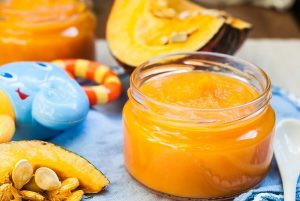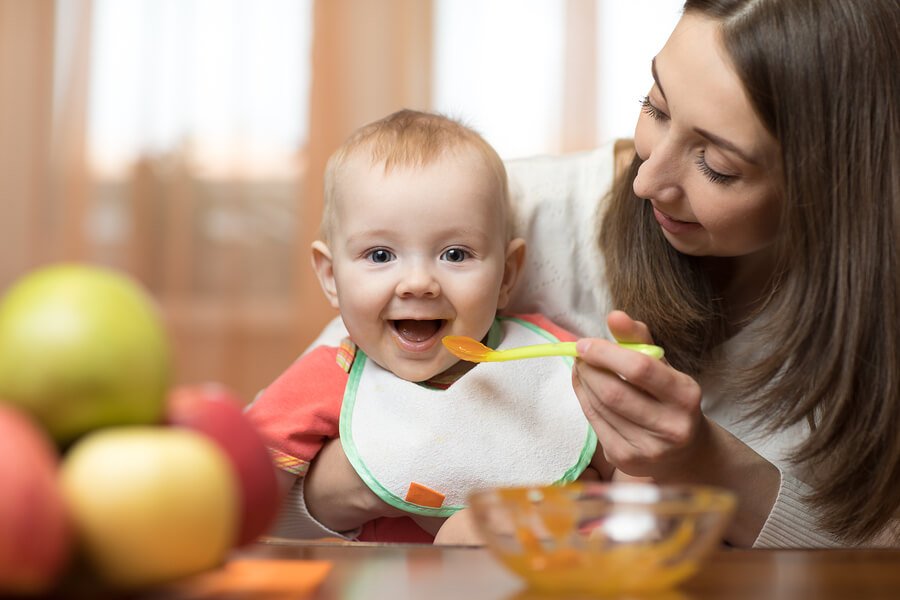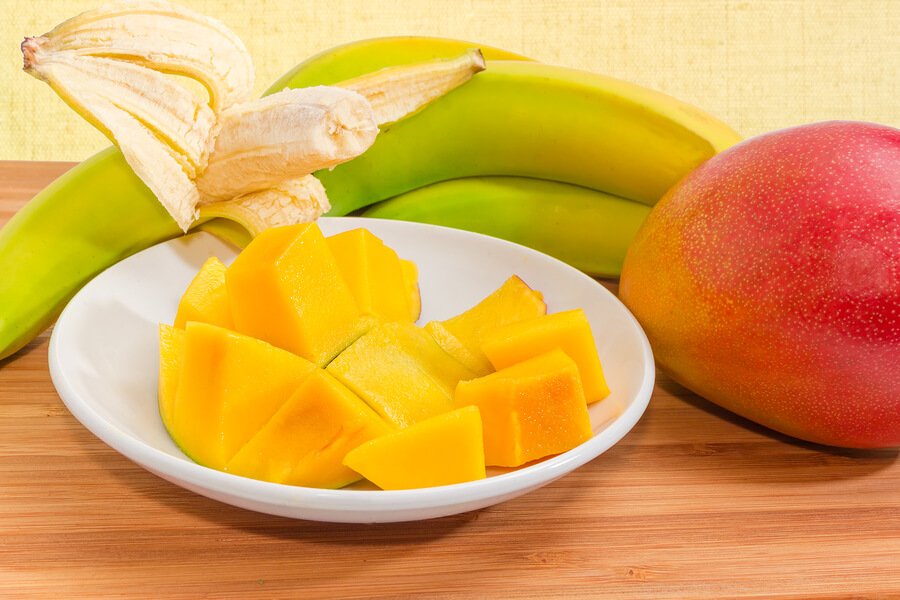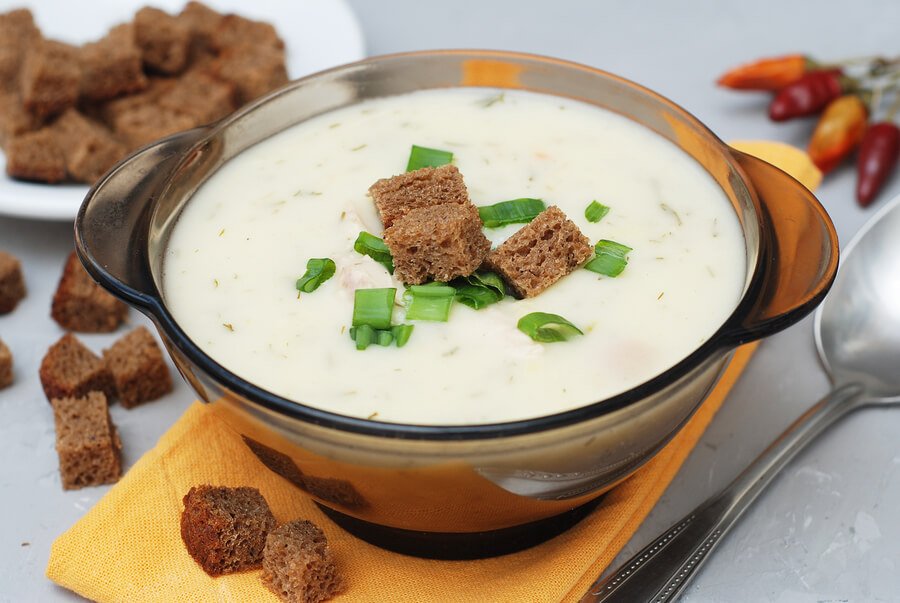Great Spoon-Friendly Purees for Babies 6–9 Months Old

To help you plan or supplement your child’s diet, here are some spoon-friendly purees for babies from 6 to 9 months old. We’ll show you which are the most appropriate foods for this stage of their development, as well as the best cooking and presentation methods.
At this stage we recommend introducing new foods in a gradual way. By this we mean that you should introduce one new food per week, and in moderate quantities. This way your baby will be able to get used to its taste, smell and texture. As a result of this, you’ll be able to enhance your baby’s diet effectively.
Guidelines for spoon-friendly purees for babies from 6 to 9 months old

Patience is a virtue when it comes to encouraging your baby to eat. However, it’s also important to implement other measures and guidelines to achieve this goal. The most important guidelines are the following:
- Use fresh, good quality food.
- Handle food in the most hygienic way possible.
- Avoid seasoning excessively, and don’t add sugar.
- Avoid combining more than 2-3 foods, as this can be too much of a shock for the baby’s palette, and difficult for the body to digest.
- Never serve excessively hot or cold foods. Serve them warm so that your baby feels more inclined to eat them.
- As for cooking meat, steaming and baking are the preferred methods. This will help your baby digest them, and will also cut down on excess fat. A further advantage is that it will retain most of its nutrients.
- Use plastic or silicone spoons to avoid irritating the baby’s gums with the contact.
- Pay attention to possible adverse reactions when eating certain foods.
- You can accompany the broths, purees and cream soups with a piece of bread, but you’ll have to cut it into pieces so that your baby will be able to chew it without any problem.
The most suitable foods
Regarding the most suitable foods for purees at this stage, we recommend opting for vegetables such as: carrots, pumpkins, squash, zucchini, and potatoes. In addition to this, fortified baby cereals, oats, wheat pasta and white rice are also good options.
In the case of fruit purees, the most suitable fruits are: pears, apples, bananas, peaches and mangos. Here are some vegetable and fruit purees for your little one to enjoy:
Spoon-friendly purees for babies from 6 to 9 months old
1. Mango and banana puree

Ingredients
- 1 banana
- 1 small mango
Preparation
- Remove the skin from the banana and the mango.
- Cut the fruit into large pieces and place them in the blender or food processor.
- Blend until you obtain a more or less thick consistency, with very few lumps.
- A possible variant of this recipe would be to replace the banana with white rice.
2. Pumpkin puree
Pumpkins are one of the most nutritious and fiber-rich vegetables for babies of 6-9 months of age. They can either be cooked in the oven or steamed. Just remember to make sure they’re nice and tender.
Don’t forget that in purees for babies from 6 to 9 months old, you need to remove seeds and large lumps that could be dangerous for your baby, or a hindrance to his digestion.
Ingredients
- 1 small pumpkin
- Water
Preparation
- Cut the pumpkin in half or into several pieces. This way you’ll be able to remove the seeds with a spoon and start to boil them in a pan until they soften.
- When they’re boiled then you need to put them into the blender. The density of the puree will depend on the amount of water added.

3. Chicken broth
Unlike purees, broth has a much softer consistency. And given that chicken is the ideal meat to introduce into babies’ diets in the first few months of their lives, the best broth you can prepare is a chicken one. Its protein content will greatly enhance babies’ development, and strengthen their immune system.
Ingredients
- 3 chicken breasts, boneless.
- 2 cups of chicken stock low in sodium.
Preparation
- Put water on to boil.
- Place the chicken in the pan and add the stock until the chicken is completely covered.
- Boil it on a medium heat for 20 minutes. You must be careful not to let the broth boil dry so that the pieces of chicken don’t dry out.
- Once cooked, the pieces of chicken should be chopped into very small pieces and processed in the blender, together with the broth, until you get a good puree.
Spoon-friendly purees for babies from 6 to 9 months old are very easy to prepare, and have a very high nutritional content. That’s why it’s a good idea to incorporate them into their diet at this stage of their development.
One last thing to remember is that, even though they may seem quite unappetizing due to their low salt content, you shouldn’t add seasoning at this stage.
All cited sources were thoroughly reviewed by our team to ensure their quality, reliability, currency, and validity. The bibliography of this article was considered reliable and of academic or scientific accuracy.
- Fidler Mis N., Braegger C., Bronsky J., Campoy C., et al., Sugar in infants, children and adolescents: a position paper of the european society for paediatric gastroenterology, hepatology and nutrition committee on nutrition. J Pediatr Gastroenterol Nutr, 2017. 65 (6): 681-696.
- See VHL., Mas E., Prescott SL., Beilin LJ., et al., Effects of postnatal omega 3 fatty acid supplementation on offspring pro resolving mediators of inflammation at 6 months and 5 years of age: a double blind, randomized controlled clinical trial. Prostaglandins Leukot Essent Fatty Acids, 2017. 126: 126-132.
This text is provided for informational purposes only and does not replace consultation with a professional. If in doubt, consult your specialist.








